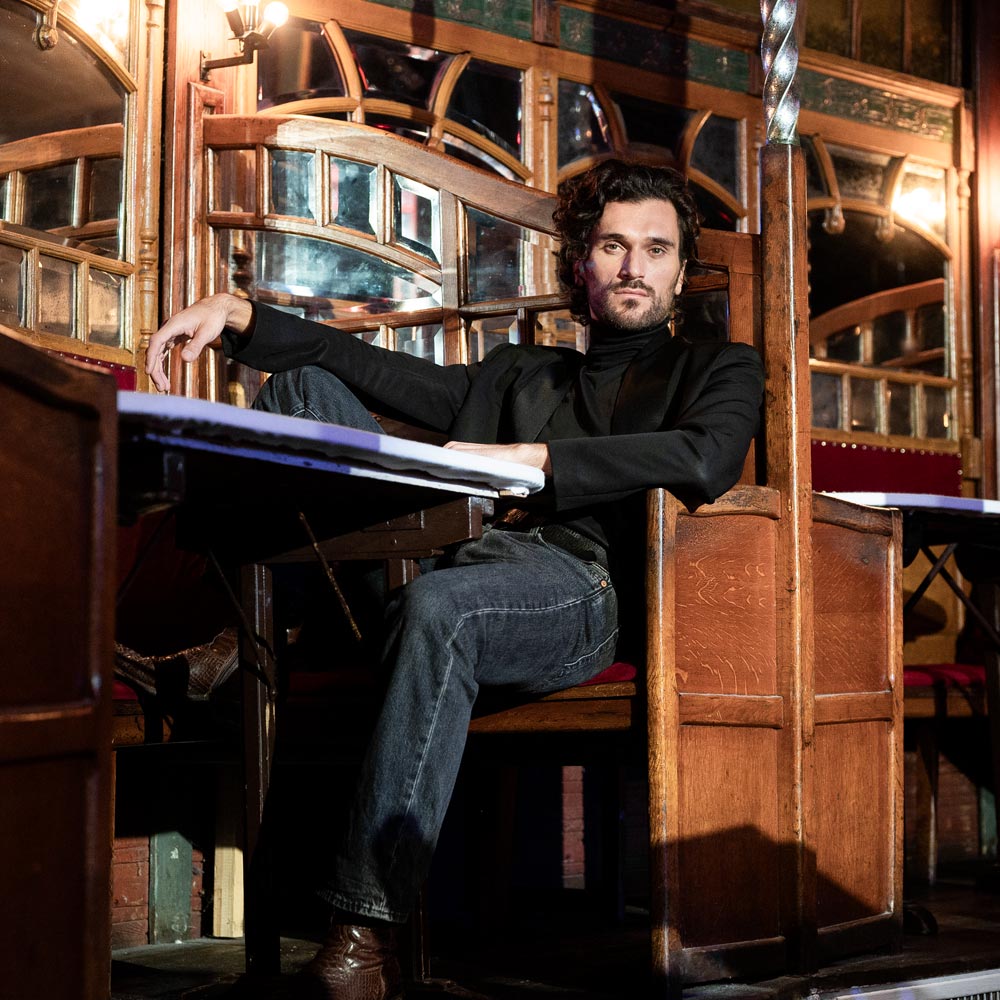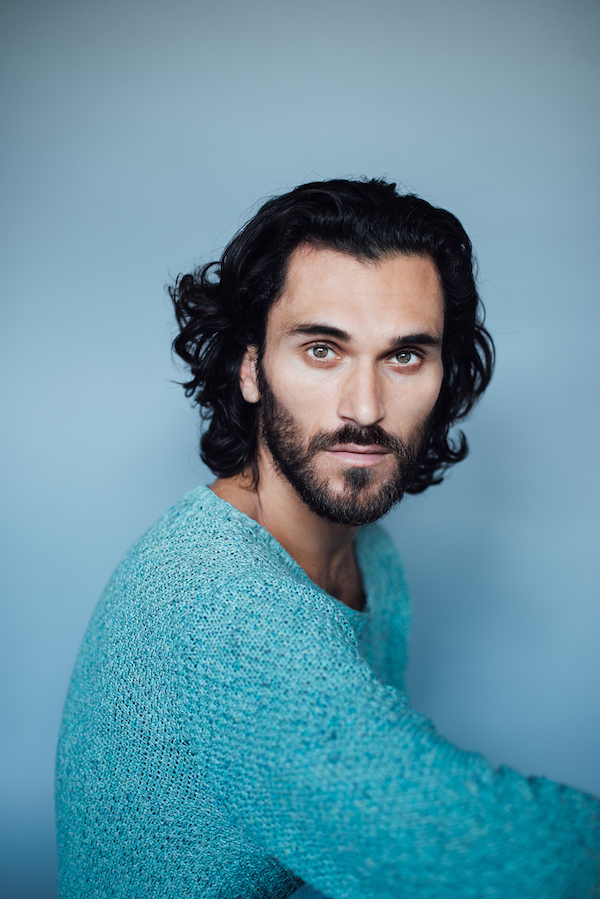
Over the past 10 years, Berlin-based singer Vladmir Kornéev has recorded five critically acclaimed albums, toured Europe, played with symphony orchestras in Germany and Montreal, and smoldered on the small screen in Netflix’s “The Empress,” winner of last year’s Emmy Award for best international series.
On May 19, Kornéev will be in the Bay Area to make his United States concert debut. The auspicious event — already close to sold out — will take place not at Davies Symphony Hall, Berkeley’s Zellerbach Theater, or the Herbst, but in a 160-seat auditorium at the Orinda Theatre, which the following day will return to its usual function as a movie screening room.
The little concerts that could
This booking coup is a well-deserved feather in the cap of producer Michael Williams who raised eyebrows when he co-founded “Live at Orinda” in 2018.
“Of course there was some risk,” recalled Williams during a recent interview with the Bay Area Reporter. “But I had a strong feeling that there was an audience for Great American Songbook and cabaret-style music that didn’t necessarily want to go into the city from the East Bay.”
That audience proved more than hungry. By the series’ second season, more than 25% of the available tickets had been sold to full-season subscribers. Today it’s closer to 50%, and includes patrons from San Francisco drawn over the bridge by the series’ intimate setting and sometimes adventurous programming.
Williams, who was previously affiliated with Bay Area Cabaret, which produces shows at the Fairmont Hotel’s Venetian Room, has been pleased to discover that his patrons are musically open-minded and willing to trust his curatorial taste.
Along with enjoying well-known American cabaret performers who also appear at Feinstein’s at the Nikko, Orinda audiences have welcomed major talents from abroad; both familiar, like Ute Lemper, and on the cusp of likely U.S. stardom, like Kornéev.
Between his series’ track record of sold-out shows and his longtime friendship with Kornéev’s manager, Williams was able to land the national debut of this one-time political refugee with a personal history that resonates amidst today’s global turmoil.
Escape into music
“I saw a lot of violence in my childhood,” recalled Kornéev, 37, a native what is now the country of Georgia, in a video interview with the Bay Area Reporter.
“My father was fighting in the civil war against Russia, and there were many times when I was very afraid. I developed a severe stutter, which embarrassed me.”
The physical danger and psychological toll of the war ultimately led Kornéev’s father and mother, a teacher, to have the family flee the country in 1991. After spending time in a refugee camp in Germany, they settled in the small Bavarian city of Augsburg.
Over dinner at the apartment of another refugee, a woman from Ukraine, seven-year-old Kornéev was mesmerized when their host played Beethoven on a weatherbeaten used piano.
“She realized how hypnotized I was,” recalled Kornéev, an only child. “She told my mother, ‘I think your son wants to play piano.’ My mother explained that we didn’t have the money, and she said, ‘I will teach him, and you pay me when you can.'”
“It’s difficult to get work as a refugee, and my father worked several jobs,” Kornéev continued. “But I had my stutter and, you know how school children can be, so I didn’t have many friends. I begged my parents and they allowed me to study the piano, and this is where my involvement with music began.
“I developed a determination to be the top pianist and practiced for very long periods, five hours or more a day. By the time I was 14, I was winning competitions and I had my first solo recital when I was 15.”

Transcending trauma
At the Augsburg high school for the arts where Kornéev continued his piano studies, all students were required to sing in the school choir.
“I hadn’t realized, but something happens in the brain of a stutterer that allows you to sing without a problem,” he recalled. “I loved this. Singing became a way of feeling free in my body and expressing myself that I’d never had during my childhood. So I always sang very dramatically. I wanted to be a little louder and with a little different timing than my schoolmates, so I could stand out.”
Kornéev’s love of drama intensified when, at 15, he went to the theater for the very first time on a school trip.
“It was Shakespeare’s ‘A Midsummer Night’s Dream.’ I was in shock, in a positive way, pure shock. The costumes and the magical setting, I just couldn’t believe it. Immediately I wanted to be Puck. I told my parents I wanted to join the school theater club and this time they wouldn’t allow it. They said my grades in academic subjects needed to get better.
“I was really angry, and ended up joining secretly, without telling them. And the other students were laughing at me, because how could a stutterer be in a theater group? But again I had a very supportive teacher, who was so kind. My teachers are the great blessing of my life. He could see I was fighting with my stuttering and told me not to worry. We did a lot of body work in preparing. It was like Stanislavski, which, of course, I hadn’t heard of then.
“He gave me the lead role and I built a biography for the character, studying it meticulously. And when we began to rehearse, for the first time in my life, there was no stuttering, because I had completely projected myself into this other person.
“My parents had sent me to speech therapy and to therapy to deal with the war trauma from my early childhood, but nothing had worked. Eventually, I told my parents I’d joined the theater club and they came to the performance. I didn’t stutter even once. They were stunned. I was stunned. I can remember during the applause at the end how my whole body was shaking and I was crying.”
From the age of 17, Kornéev was no longer a stutterer.
Utopian dreams
Kornéev left Augsburg to continue his education at the prestigious August Everding Theatre Academy in Munich. While professors encouraged him to pursue a career as an opera singer, Kornéev was intensely drawn to the psychologically intricate interweaving of singing and acting found in Russian art songs, French chanson and German lieder.
“The first CD my parents ever bought for us was Piaf,” he recalled. “My mother loved her. I grew up listening to that sort of music as well as classical. Of course, as a teenager, I was influenced by the American culture that made its way to Europe; the Backstreet Boys, Christina Aguilera. I love Lady Gaga.”
Still, while Kornéev frequently slips a pop cover or two into his encores, he had made his name as a premiere interpreter of classic European 20th-century story songs, winning the German National Singing Competition for three consecutive years. In recent years, he has done a deep dive into the music of Kurt Weill, which will be the focus of his show in Orinda.
“I was asked to be the resident artist at the Weill Festival in Dessau in 2020,” he said. “I honestly wasn’t sure, because though I knew Weill, I hadn’t been listening to him much in the past few years. So before deciding, I dove into studying all his music. But when I came across the song, ‘Youkali,’ I was moved in my bones and sent back to my childhood.”
The lyrics to this bittersweet tango, which was adopted as a hymn by the French resistance during WWII, describe a lonely voyager, sailing through vast uncharted waters in search of a legendary island.
“The song connects in my mind to this little framed painting of a boat that, along with a pair of candlesticks my father gave her on their wedding day, is the only thing other than our clothing that my mother brought with her when we left Georgia.”
Kornév continued, “I remember when we were sleeping on mats in the refugee camp, she leaned it up against the wall beside us. Then, when we had our first flat in Augsburg, it hung in the kitchen. I remember sitting beside her as she cooked dumplings and imagining being on the boat and sailing away from all the terrible things I saw in my childhood. Today, it is hanging in my flat here in Berlin.”
The song’s island, Kornéev explained, is a utopia.
“It’s a place where everyone is welcome and everyone is safe. There is no violence or war, and we respect one another’s wishes for the best in life.”
